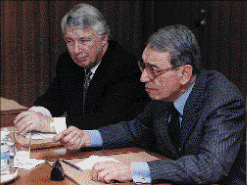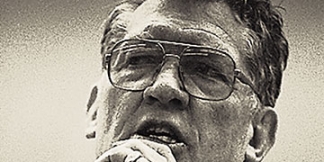By Karen Snow

BYU professor John Hughes (left) attends a press conference with U.N. secretary-general Boutros Boutros-Ghali. During a one-year leave of absence from BYU, Hughes supervised U.N. communications activities and advised Boutros-Ghali on police-making decisions.
BYU journalism professor John Hughes has the ear of United Nations secretary-general Boutros Boutros-Ghali. In fact, Hughes’ advice played a role in ending the vehement three-year Bosnian conflict last year.
Hughes, former editor of The Christian Science Monitor and director of BYU’s International Media Studies Program in the Communications Department, served as assistant secretary-general and director of communications at the United Nations on a one-year leave of absence from BYU. As part of his role as director of communications, Hughes advised Boutros-Ghali on policy-making decisions, including the civil conflict in Bosnia-Herzegovina.
“Having a voice in policy-making was really kind of an essential condition for doing that job,” says Hughes, who served two and a half years as State Department spokesman under former Secretary of State George Schultz. “It didn’t mean you always won on policy, but you had an input, and you could say what you thought to Boutros-Ghali, citing the impact it would have on public opinion.”
One of the reasons compelling Hughes to serve the one-year U.N. term, he says, stemmed from his anger over the civil atrocities in Bosnia. “The people would go on killing and raping and looting and burning and doing some dreadful things to each other. It just offended my sense of what should be happening in the world, and I thought something had to bring that to an end.”
Hughes says he felt the United Nations was the wrong instrument to end the war and recommended Boutros-Ghali withdraw the organization from its three-year submersion in peace-keeping efforts. And, in time, that’s what happened.
“The United Nations is not effective when it is sent into a war situation and is trying to separate two sides that have not agreed to separate and still want to go on killing each other, which they did in Bosnia,” he says. “The United Nations is effective as a peacekeeper in situations where the warring parties have agreed to stop fighting but need an institution like the United Nations to monitor the agreement.”
Hughes, a Pulitzer Prize–winning journalist, resumed teaching at BYU in January 1996 but agreed to continue as a U.N. consultant and advisor when Boutros-Ghali asked Hughes to stay. “The fact that you’re living in Utah is really no impediment these days to saying what you think in New York.”
During his one-year term, Hughes worked closely with U.N. spokespersons and coordinated the mass of written material released by the United Nations’ large department of public information. Hughes also functioned as strategist for Boutros-Ghali. Traveling with the U.N. leader, Hughes recommended which invitations to accept, where to speak, which interviews to give, and which audiences to address with which message. “You can have the best policies in the world, but if you can’t articulate them to the various publics that will support them or not support them, then your policy is ineffective,” he says.
Hughes returned to the United Nations for spring term to continue his work in person, reviewing projects and plans with Boutros-Ghali and advising him on advancement of U.N. policy.
Despite urging from Boutros-Ghali, Hughes returned to his life at BYU at the close of the term. “I love BYU!” Hughes says. “I like what I’m doing here, . . . and I enjoy very much the atmosphere.”
Boutros-Ghali recruited Hughes in 1994, asking Hughes to join the U.N. staff full time. Hughes initially declined the offer due to his obligations at BYU. Not satisfied, Boutros-Ghali suggested Hughes take the position on a one-year leave of absence, and Hughes later agreed.
Hughes describes Boutros-Ghali as a brilliant and charming man. “He’s dealing with 185 member states and he has just got this amazing expertise in his head,” Hughes says. “He can also be, which many people find very hard to believe, very funny.” Sketching his rapport with Boutros-Ghali, Hughes jokes, “He’ll take my advice–a great number of men don’t.”
Hughes first became familiar with the United Nations as a news correspondent working in Africa and the Middle East in the 1950s. “I’ve always been tremendously impressed with the United Nations’ humanitarian efforts. It’s a tremendous force for good, and it’s done a good deal for mankind,” he says. “So I had that background of admiration for the United Nations and a belief in it and its utility for a long time.
“I went into the United Nations thinking it was a noble cause, and, despite its flaws and occasional failings, I came out of it confirmed in my view.”









